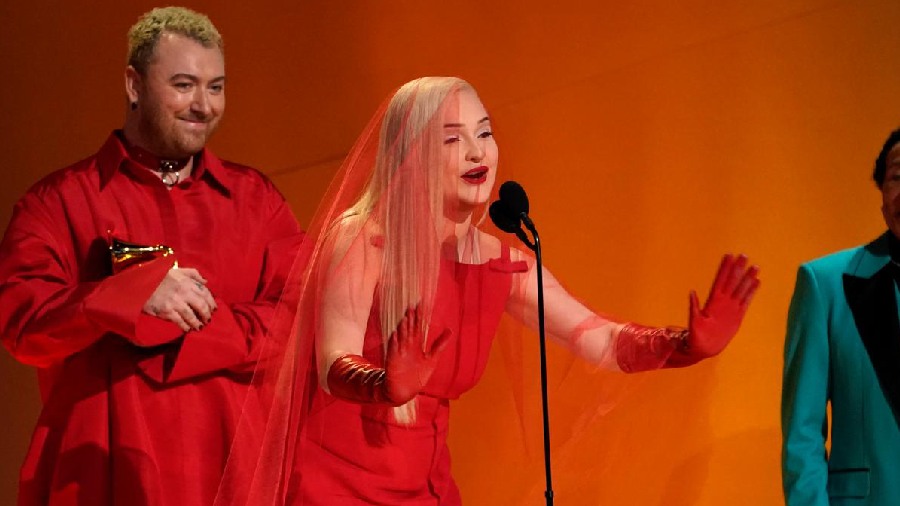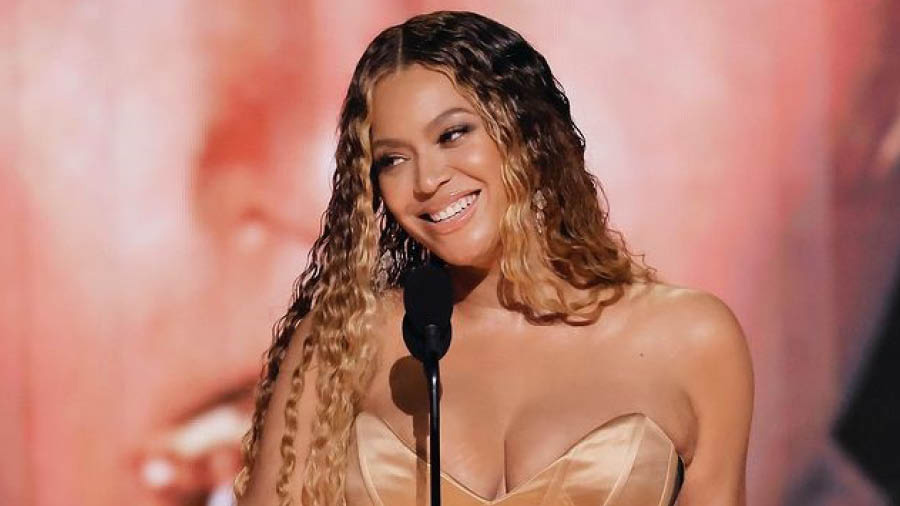When Kim Petras teamed up with English singer Sam Smith on "Unholy," a song about male infidelity and betrayal of the ideal of marriage, she may not have expected to make history.
But now, the German pop singer Petras is the first transgender woman to win a coveted Grammy in the Best Pop Duo/Group Performance category.
At the Grammy Awards on Sunday, Petras thanked "transgender legends before me who kicked these doors open for me so that I could be here tonight." She nodded to pop star Madonna for her fight for LGBTQ rights: "I don't think I could be here without Madonna."
She also expressed gratitude to her mother. "My mother — I grew up next to a highway in nowhere, Germany, and my mother believed me that I was a girl, and I wouldn't be here without her and her support," Petras said.
Already made history before
Back in October 2022, the duo Petras and Smith had already become the first publicly transgender and nonbinary solo artists, respectively, to have reached the top of the Billboard Hot 100 charts with their single.
While Smith's 2014 single "Stay With Me" was a number 2 hit — and the singer has topped the charts in the UK eight times — this was new terrain for Cologne-born Petras.
Having written songs for the US rapper Fergie and R&B singer Rihanna, earned comparisons to Lady Gaga, and landed a Spotify viral hit with 2017's "I Don't Want It At All" (the clip features a Paris Hilton cameo), the LGBTQ star was yet to reach pop's summit.
Now, her collaboration with Sam Smith singing about a "dirty, dirty boy" has catapulted the trans musician to the next level.
It was, however, a long journey to get there.
A story of self-empowerment
Born in Cologne in 1992 and raised in the nearby town of Hennef, Kim Petras was already coming to terms with her identity by the age of two.
"I have always felt like a girl. I hated my body when I was five," she told the newspaper Die Zeit. "I couldn't identify with gender, wanted it gone." She ran through her room with a pair of scissors, wanting to "cut it off," she said.
The child suffered from being stuck in the wrong body. "I was lucky to have parents who really understood me," she said. But others showed much less understanding.
"There were strange doctors," she remembers, "who told me: You're crazy."
Bullying in the playground
Some classmates also bullied her in the playground. At the age of 10 she started to see psychologists.
Two years later, she changed her first name to Kim. She sometimes went to school in latex clothes. "At least I wanted to be well dressed if someone threw their school lunch at me," she recalled.
After experts confirmed to Petras' parents that their child was transgender, they understood her panic as puberty approached.
"That's when we recognized her distress, her fears of growing a beard and her voice changing," father Lutz said in in an interview in 2007 about his child who was then undergoing hormone treatment.
As a 16-year-old, Petras went public with the news she was having gender-affirming surgery. She made headlines for being one of the youngest transgender persons in the world who had transitioned.
By then, Petras had already began to publish her own pop songs on the internet.
At the age of 19, the aspiring pop star moved to Los Angeles. The first months were tough.
"I flew to LA, where I knew one or maybe two people from the internet," she told DW in 2018. "I slept on couches in studios, had little money and just a few contacts."
'I wasn't discovered. I discovered myself'
Petras built a following through posting tracks online and club shows. She has remained an independent artist because major labels "only wanted to talk about my gender," she told Glamour Magazine. "People were like hide it or use it, and I didn't want to do either."
She has released two solo albums and collaborated with musicians such as Dr Luke, Charli XCX, Kygo, Paris Hilton, and of course Sam Smith.
And Kim Petras has continued to make it on her own. "I wasn't discovered. I discovered myself," she told Interview Magazine last year.
The huge success of "Unholy" might come as a surprise to an artist who had never made the top 40, but it fulfills a long-cherished dream to see a trans person top the US charts, and garner a Grammy — even if she never thought it possible.
Does it matter to her songs that she is transgender? "No," she told Die Zeit. "It's more about human things: love, grief, how I imagine my life."
But she will always be part of the LGBTQ community and advocate for it. "Sure, my transsexuality makes me special," she says, "But I want to be known for being a good artist."











